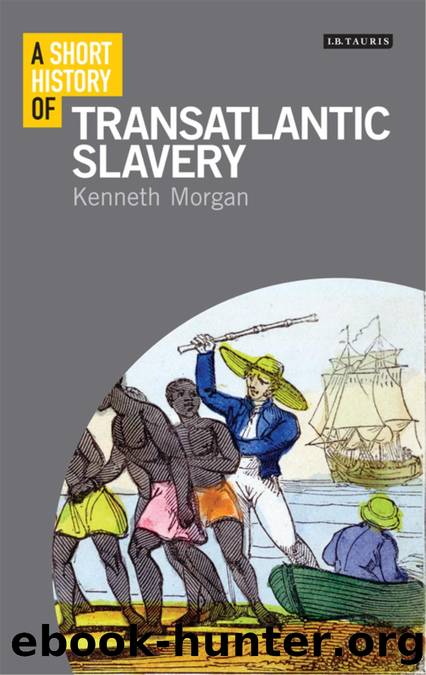A Short History of Transatlantic Slavery by Kenneth Morgan

Author:Kenneth Morgan
Language: eng
Format: epub
ISBN: 9780857728555
Publisher: Bloomsbury Publishing
Published: 2019-11-22T00:00:00+00:00
INTERNATIONAL ACTION AGAINST THE SLAVE TRADE
After the dual abolitions of their respective slave trades in 1807â8, Britain and the United States exercised influence on further prohibitions of the traffic. But the sheer growth of the slave trade for over forty years thereafter, largely to Brazil and Cuba (as Chapter 1 has shown), suggests that the influence of the dual abolitions on the abolition of the slave trade by other powers was somewhat limited.70 Britain nevertheless undertook the role of controlling the continuing transatlantic slave trades after 1808 by maintaining a West Africa Squadron in the Atlantic to intercept suspected illegal shipments of slaves. This preventative body increased the numbers of its vessels over time.71 Courts of Mixed Commission and Vice-Admiralty courts in Sierra Leone and Cape Town were established in which British, Portuguese, Spanish, Dutch and Brazilian judges heard cases. British diplomacy, in particular, proved influential in securing the formal abolition of the Dutch, French, Spanish and Portuguese slave trades between 1814 and 1830. Only the newly independent republics in Venezuela and Argentina ushered in abolition on their own, between 1810 and 1813, partly because they wanted British recognition of their new status. In few cases of abolition after the British ending of the slave trade were grassroots anti-slave trade movements important for influencing the course of action. Of greater importance was the example set by Britain and the demonstration that nations with flourishing slave trades could bring transatlantic slaving to an end.72
Britain, in particular, expended a great deal of effort to eradicate the international slave trade. These initiatives ranged widely in geographical terms. They included the writings, speeches, lobbying activity and petitions of abolitionists; various organizations that served as foci for these initiatives; diplomatic pressures and negotiations between government officials, abolitionists, and representatives and statesmen of other nations; the efforts of the Royal Navy to suppress slave trading off the West African coast; the contribution of the Mixed Commission and Vice-Admiralty Courts in freeing Africans who had been illegally forced into the transatlantic slave trade; and Britainâs contributions to international treaties and conferences. The Mixed Commission Courts, resulting from bilateral treaties between Britain and Portugal, Spain, the Netherlands, Brazil and the United States (1817â62), were most active when in the hands of British commissioners.73 Some British measures to suppress the Atlantic slave trade focused on West Africa. The Royal Navy, for example, staged a naval blockade of Ouidah, the main port for the Kingdom of Dahomey, and intervened militarily in Lagos, both in 1851â2.74
The British took nearly 90 per cent of all captured slave ships in the nineteenth century. Nearly 200,000 slaves were liberated from those vessels.75 Nevertheless, there were strict practical and strategic limitations to the use of force to achieve an international abolition of transatlantic slaving. In the 1840s and 1850s Britain had no legal authority to search slave ships sailing between Angola and Brazil. Operational and diplomatic impediments also hampered attempts to curtail that branch of the trade. The United States refused to join the system of mixed commissions until Abraham Lincoln became President in 1861.
Download
This site does not store any files on its server. We only index and link to content provided by other sites. Please contact the content providers to delete copyright contents if any and email us, we'll remove relevant links or contents immediately.
| Central Africa | East Africa |
| North Africa | Southern Africa |
| West Africa | Algeria |
| Egypt | Ethiopia |
| Kenya | Nigeria |
| South Africa | Sudan |
| Zimbabwe |
Goodbye Paradise(2969)
Men at Arms by Terry Pratchett(2407)
Tobruk by Peter Fitzsimons(2064)
Pirate Alley by Terry McKnight(1910)
Arabs by Eugene Rogan(1837)
Borders by unknow(1788)
Belonging by Unknown(1468)
The Biafra Story by Frederick Forsyth(1324)
It's Our Turn to Eat by Michela Wrong(1305)
Botswana--Culture Smart! by Michael Main(1238)
A Winter in Arabia by Freya Stark(1225)
Gandhi by Ramachandra Guha(1196)
Coffee: From Bean to Barista by Robert W. Thurston(1182)
Livingstone by Tim Jeal(1152)
The Falls by Unknown(1142)
The Source by James A. Michener(1135)
The Shield and The Sword by Ernle Bradford(1101)
Egyptian Mythology A Fascinating Guide to Understanding the Gods, Goddesses, Monsters, and Mortals (Greek Mythology - Norse Mythology - Egyptian Mythology) by Matt Clayton(1088)
Africa: Altered States, Ordinary Miracles by Richard Dowden(1078)
